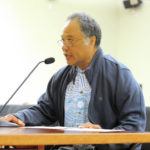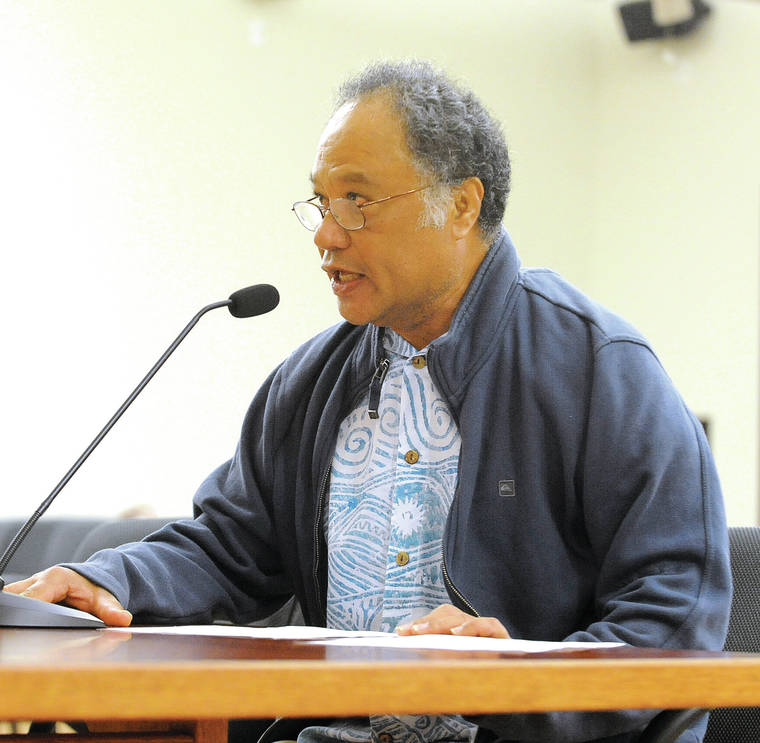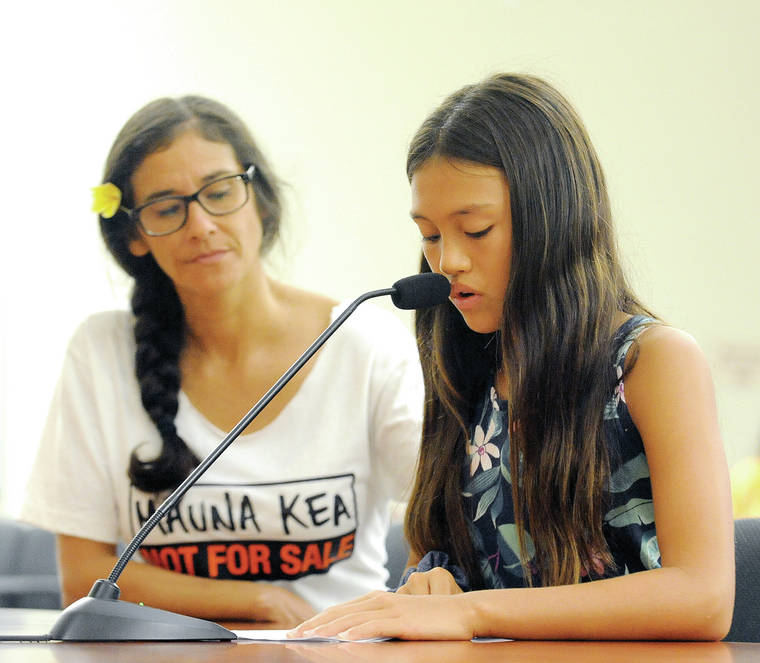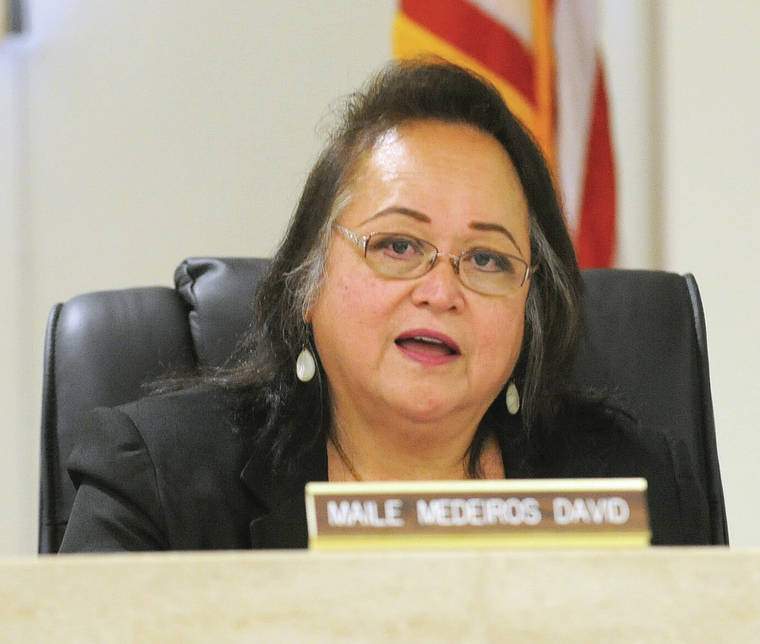HILO — Testimony ranged from poetic to pragmatic to piqued. But all speakers were passionate and tears flowed on both sides of the dais Wednesday as the County Council passed a nonbinding resolution backing state Sen. Kai Kahele’s call for a 60-day moratorium on construction of the Thirty Meter Telescope on Maunakea.
The 6-3 vote followed testimony from 45 individuals, 10 of whom opposed Resolution 233. Kahele proposed the moratorium as a chance for all sides to get together and come to an agreement on how to best resolve the current standoff on the mountain, as more than a thousand self-described “protectors” block the access road and keep construction equipment at bay. Thirty-eight people have been arrested so far.
The saga is about much more than a telescope on a mountain.
Supporters of the moratorium described decades of mistreatment of Native Hawaiians and the lands some hold sacred. They said the dispute has pitted family members against each other and caused division in the community.
“Our land is dying and it’s not just in Hawaii,” said Kamanawa Kinimaka, who traces his lineage back to the royal guard for King Kalakaua. “What the Hawaiian represents is a symbol of the indigenous native people of our world. … The Hawaiian people have been refined into a fine diamond of symbolism.”
“TMT is not a big issue. The big issue is our government and the mishandling of natural resources, mismanagement of our mauna,” said Ikaika Marzo. “TMT is just a match after so many years of gasoline being poured on our ground.”
“This is an act of war to the mauna and the kanaka,” said Millicent Cummings, one of the few on either side to raise a voice in anger. “The TMT project has been an insult from the beginning. … We’re going to sue and sue and sue and sue. … So much money is wasted for a telescope.”
“We are dedicated to educating all about what happened at the overthrow, what happened since then and how we can move forward,” said Robert Yamada. “TMT is the catalyst. It’s the line in the sand. Do not cross that line.”
Opponents of the moratorium said TMT developers have followed the legal process for 10 years and now hold all the necessary permits to begin construction. They noted the $1 million annually TMT has been providing local schools for math and science education, the 300 jobs during the 10-year construction period and the 140 high-tech jobs to be available after that.
“TMT has been through a lengthy, very public 10-year process,” said Yvonne Verburgt, a substitute teacher who wore an “Imua Maunakea and TMT” shirt. “I respect the protectors and the right to protest but not to break the law.”
“Unfortunately, TMT came about at the same time as our president set the standard of political discourse. Lies, division and obstruction are the new norm. Opposition to science, opposition to people who are not like yourself, opposition to protecting the environment are the new norm,” said Tom Cumming, senior software engineer for Gemini Observatory, one of 13 telescopes currently on the mountain. “A 60-day waiting period will mean 60 days of more creative social media memes, 60 days of entrenchment, 60 days of solidifying their base, 60 days of division.”
Councilmembers were also divided. South Kona/Ka‘u Councilwoman Maile David, sponsor of the resolution, said she felt compelled to rush the resolution to the agenda after seeing what is happening on the mountain.
“This has been such an emotional morning for everybody,” David said. “This is not our jurisdiction. This resolution encourages the governor to talk story and that’s what we can do.”
Hamakua Councilwoman Valerie Poindexter, North Kona Councilwoman Karen Eoff, Kona Councilwoman Rebecca Villegas, Hilo Councilwoman Sue Lee Loy and Puna Councilman Matt Kanealii-Kleinfelder were the other yes votes.
“Out of respect for both sides we need that,” Poindexter said. “I think it’s time to just sit down. Feelings are escalating on both sides.”
“My heart breaks when I hear the speeches of some. … This is so much bigger than any one of us or all of us together,” Villegas said. “Asking people to abide by a legal system that they never agreed to, to begin with, is ironic.”
Lee Loy voted yes with reservations. She wanted more time to tweak the resolution, seeking a cooling off period without a moratorium, so as to reflect the collective voice of the entire council. David opposed changing the wording.
“I support the intent of a cooling-off period,” said Lee Loy. “You had sisters testifying about law enforcement about their own brother.”
Puna Councilwoman Ashley Kierkiewicz, who voted no with reservations, said she understood why so many distrusted the government to do the right thing on the mountain.
“No matter what is chosen, not everybody is going to be happy. … We’re sworn to uphold the law even if we disagree with the decisions. … I 100% support all parties coming together to talk story. … It’s not going to be easy or pretty. It’s going to be messy,” Kierkiewicz said. “But we don’t need a moratorium to come together.”
Other no votes were Hilo Councilman Aaron Chung and Kohala Councilman Tim Richards.
“I have no problem with peaceful protest, but they, the protectors, are blocking the road and that’s against the law,” said Chung, an attorney. “I hope people can understand that I’m standing for the law. If the parties can come together and work things out, fine, but I don’t think a moratorium is going to do it.”
“Disallowing TMT to go forward is shortsighted and is jeopardizing the future of our next generations. We need sound practices that are culturally sensitive, environmentally friendly and supply us with economic resources that help our community flourish,” said Richards, a sixth-generation kamaaina. “I hope that we will learn from this harrowing period. History tends to repeat itself unless we choose to set a new course.”
Kanealii-Kleinfelder had history in mind as well.
“I believe the decision made here will be one of the most momentous decisions in the history of this state,” he said. “This is not about politics anymore. This is about supporting the people who live here.”













